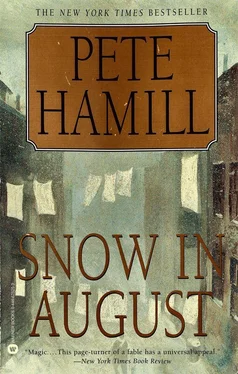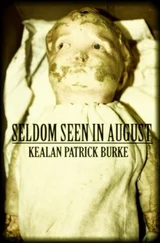Her voice mixed with the radio, a tune called “The Anniversary Song.” Al Jolson. He heard a phrase about how the night was in bloom though a word wasn’t said. Kate was talking about getting boxes from Roulston’s grocery, and how he could begin packing his own things on Saturday. But he didn’t even try to imagine the move, the new apartment, a garden. He was thinking only about the night ahead.
“Sometimes bad times are really for the better,” she said. “We can throw out a lot of junk, and—” She noticed his clothes and smiled. “You’re dressed to play ball!”
“Yeah.”
“Where?”
“Up the park.”
His plate was already clear, and he got up to wash it in the sink and place it in the drainer.
“You’ve made it up with those two so-called friends?”
“Well… I don’t know. I’ll just try to find a game.”
“Be careful with that leg, now,” she said.
Off he went, wearing his I’M FOR JACKIE button as a badge of defiance. He took the long way to the synagogue. Walking fast on what felt like a brand-new leg. Off to Kelly Street. Through the door. Into the upstairs sanctuary.
Then he started to work at the long, deep sink, murmuring the instructions from Rabbi Hirsch as if they were part of the mass. He ran some water and stirred the dirt and water with the long silver spoon to make mud. He stripped off his shirt and trousers to keep them clean, because later he had to be dressed in pure white. Then he started shaping the mud. A torso. Arms. Legs and feet. A head. Stepping back to be sure the proportions were right. Shaping the details of the face with the handle of the heavy spoon. Making an opening for the mouth. Dividing fingers and toes.
He was on the banks of the Vltava. He was waiting for fog. He imagined a red moon. His sweat splashed into the mud. Hours passed as he refined and refined his work. The light in the sanctuary shifted with the sun.
When he was finished, he walked as instructed to the four corners of the sanctuary and gathered dust and dirt in his hands and sprinkled it over the mud. As the mud dried, he smoothed the rough spots on hands and face until he could refine them no more. Then he went to the loft above the front door and found a worn, paint-spattered wooden stepladder. Right where Rabbi Hirsch said it would be. He carried it down to the sanctuary floor, bumping into walls in the tight stairway, knocking a wooden collection box to the floor. He carried the ladder to the front of the sanctuary, opened it, and adjusted the brace. He climbed up the rungs, as the ladder swayed and creaked, and lit the fat, squat candle of the eternal light with a wooden match. A soft, golden light immediately suffused the room.
Now he was very hungry. He went downstairs to Rabbi Hirsch’s room and washed his hands in the sink and took apple juice from the small refrigerator and drank straight from the bottle. The juice was cold and sweet, but the bottle shook in his hand and the perspiration would not stop dripping from his body. He dried himself again with a towel, but the sweat returned. He sat down at Rabbi Hirsch’s table, trying to be very still, struggling to control his fear. He was afraid of what he was about to do. Afraid he would succeed. Afraid he would fail. No: he would not fail. He believed. He would make it all come true. God would recognize him, his belief, his need. It would happen. Yes. It would happen, it would happen.
“Believe,” he whispered to the silence. “I believe.”
His gaze drifted to Leah’s photograph and he wished he could talk to her. He wished he could talk to Rabbi Hirsch too. But he was alone here in this place, and there was nobody to talk to except God.
Whispering an Our Father, he climbed the dark stairs to the sanctuary. There could be no more delay. Shabbos was almost here. He pulled on his clean white baseball pants and his white T-shirt. He stared down at the shaped mud. He opened the ceramic box and saw the shem: a rolled yellow parchment an inch wide, so old that the paper was leathery to the touch. He walked to the edge of the bimah and eased the shem into the hole he’d made for the mouth. Then he took the spoon in hand again and used the point of the handle to letter a single word on the brow of the head.
’EMET.
It meant Truth.
Then, standing behind the head, he took a deep breath, raised the spoon over the shaped head, and began to chant. The prescribed sounds were all letters. A , and B , and C , and D , right through the alphabet. First in English; then, to be sure, in Yiddish. The aleph-bayz . Seven times for each letter, followed by the letters that Rabbi Hirsch had told him stood for the secret name of God.
YHVH.
YHVH.
YHVH.
YHVH.
YHVH.
YHVH.
YHVH.
The secret name echoing mightily through the empty sanctuary.
Then he added vowels, A-E-I-O-U , seven times, again followed by the name of God. All the time moving, forming a wheel, doing a kind of dance around the sunken bimah , making a circle that traveled from right to left. Following the commands of Rabbi Hirsch. Feeling his own body charged with power and mystery. Believe, he thought. Believe. Here is the Kabbalah. Believe.
For the mystery was all about letters, Rabbi Hirsch had told him. Numbers too, in Kabbalah, but above all, letters; for from letters we make words, and words are the names of life. They name arms and legs and faces. They name men and women, insects and animals, and the creatures of the sea. They name oceans and rivers and cities. They name the grass. They name the trees. God gave letters to man and man made words from the letters and used them to name God’s nameless world. And Michael remembered from catechism class, In the beginning was the word, and the word was with God .…
So Michael danced and chanted, repeating the letters in pairs and in triplets, then singing them as if they were sacred music, the room growing darker now as the sun faded, while Michael tried to will himself into the inert mud. He rose into a frenzy of words and letters, hearing sounds from his mouth that he did not think, moving to music that nobody played, rising into clouds, moving palaces across distant skies, speaking to birds, joining hands in a dance with Mary Cunningham and the Count of Monte Cristo, soaring and swooping and breaking for third, up, rising up, full of rain and fire and salt and oceans, all the way up, chanting the letters that named galleons and cowboys, pirates and Indians, borne by the letters, swept through golden skies, above the crazy world, above Brooklyn, above Ireland, above Prague, above the fields of Belgium.
And then fell to his knees in utter emptiness. He had no more words in him. He had no more letters. He had no more music. He wanted to vanish into a dreamless sleep. Here in the sweet dusty darkness. He could hear the cry of a bird like a sound of morning. And then the barking of a dog. But he did not rise. He stretched out on the floor, facing the Ark.
And then the mud began to glow.
A deep red.
Then a brighter red. Like something in an oven. Michael rose to his feet, his heart beating in fear.
He stepped back, afraid to look into the sink, retreating into the shadows, but the glow grew more intense. Two minutes. Five minutes. Ten. Like something deep in the coals of a sacred furnace.
And then a chilly breeze blew through the sanctuary. The burning wick flickered in the eternal light. Dust lifted from benches, and cobwebs bent and snapped. Something clattered to the floor in the darkness. The windows rattled. Michael felt the floor tremble and heard a wild sound of birds rising from the roof and then a high-pitched sound like a dog whistle, hurting his ears, piercing his brain.
Читать дальше












